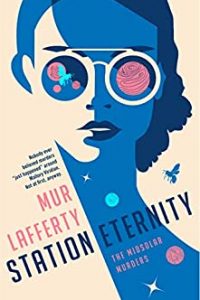Rich Horton Reviews Short Fiction: F&SF and Speculate
 F&SF 5-6/21
F&SF 5-6/21
Speculate, Dominique Hecq & Eugen Bacon (Meerkat) January 2021.
Sheree Renée Thomas’s second issue of F&SF is a strong one, and the longest stories are particularly good.” In “Babylon System” Maurice Broaddus tells of Lij Tafari, newly and unjustly sent to prison in an alternate America that is part of the Albion Empire. In some ways it’s a classic prison narrative, with the protagonist remaining proud in the face of attempts to dehumanize him, making friends and enemies among the prisoners, etc. But it works very well, partly because it’s well written and the narrative is propulsive, partly because of the nicely handled resonances with the contemporary prison-industrial complex (even in this alternate history), but mostly because of the effective characterization of Lij, and his intriguing personal history, and the underplayed but suggestive alternate historical aspects. (Also, it’s just plain exciting!)
Robert Grossbach‘s novella “Refugees” is a sequel to his earlier F&SF story “Entrepreneurs”. Morty Rushman is on trial for Criminally Negligent Homicide, because the tiny aliens he allowed to settle underneath his backyard expanded to another yard in the neighborhood, eventually causing a woman to fall and die. We met those aliens in “Entrepreneurs”, when they gave Morty the secret to antigravity (with sadly limited applications). Now they have fled their home planet, due to a change in the political situation, and have begged Morty for asylum, with the abovementioned unfortunate consequences. The story also involves cannabis, a Galactic civilization, Morty’s family troubles, and a good deal more, and it’s as funny as you might hope. A concluding novella is in the works, so we might have a chance to see that now-rare beast, a novel-length fix-up made of separate linked novellas.
Marie Vibbert‘s “The Plus One” is an affecting story of Blaine, a Marshal on a tenuously colonized Mars, who is presented with the problem of a woman who died of exposure. She learns that the death was preventable, except that no habitat would take the victim in, because she was a “plus one” – not the productive member of a couple – and her wife died. This outrages Blaine, but banging her head against bad corporations and government bureaucracies will only bring trouble… and maybe the right response to trouble is to make more trouble (of a benign sort) yourself. It’s interesting and heartwarming. Corey Flintoff retells an old Scottish tale in “Molly Whuppy“, about a girl abandoned by her parents, who joins with a magpie to eventually outwit a giant and a greedy local king. As with many folk tale retellings, it’s the voice that carries the story, quite effectively.
There’s a welcome appearance from Rich Larson, who seems as prolific as Robert Reed once was, and as varied in his themes, genres, and approach. “The World, a Carcass” is about Daxla, whose father, the old king, has just died, and whose uncle is now ruling. Daxla’s mother, never stable, has become an “Oracle,” possessed by the spirits called “Them.” Daxla is confined to the palace as her uncle looks for an appropriate person to marry her off to. She slowly gains awareness of her situation, and its dangers, especially as she grows closer to her guard, a man who had reason to hate her father, who had disgraced him, and stripped him of rank and name. The outline of this story is clear enough, and I can’t say it transcends its familiar shape. Daxla and the nameless guard and the priest and her uncle and the political situation, even if each is a familiar character type, are still intriguing, and the plot is well manipulated. This is just neat, thrilling palace intrigue.
Also in the May-June F&SF is a short-short by Eugen Bacon, “When the Water Stops“, a dark reflection on a climate-ravaged future.
At it happens, I also just read Speculate, a book of very short pieces, prose poems or, as the subtitle puts it, “microlit,” by Bacon and Dominique Hecq. These are more like poems, to my ear, than stories – and quite effective ones. The conceit is that the book is divided into two parts – in each part one writer’s prose poem is answered by one from the other writer – the first serving as sort of a prompt for the second. It’s hard to review those pieces, but I’ll briefly mention a couple of the more SFnal ones. (The whole book, though, is worth reading if you respond to prose poetry – this is some nice work in that vein.) In “None of this is a dream” Bacon imagines Mars as an ocean and beach, and Hecq’s response places an intelligent Martian as the viewpoint. “Ariadne dreams of a new relativity” opens with Hecq’s imagination of Ariadne urging the Minotaur to, in a sense, make a new physics to transcend the Labyrinth, while Bacon’s response imagines the Minotaur in a sort of Labyrinth of contemporary pop culture and science.
Recommended Stories
“Babylon System”, Maurice Broaddus (F&SF 5-6/21)
“The World, a Carcass”, Rich Larson (F&SF 5-6/21)
“The Plus One”, Marie Vibbert (F&SF 5-6/21)
Rich Horton works for a major aerospace company in St. Louis MO. He has published over a dozen anthologies, including the yearly series The Year’s Best Science Fiction and Fantasy from Prime Books, and he is the Reprint Editor for Lightspeed Magazine. He contributes articles and reviews on SF and SF history to numerous publications.
This review and more like it in the June 2021 issue of Locus.
 While you are here, please take a moment to support Locus with a one-time or recurring donation. We rely on reader donations to keep the magazine and site going, and would like to keep the site paywall free, but WE NEED YOUR FINANCIAL SUPPORT to continue quality coverage of the science fiction and fantasy field.
While you are here, please take a moment to support Locus with a one-time or recurring donation. We rely on reader donations to keep the magazine and site going, and would like to keep the site paywall free, but WE NEED YOUR FINANCIAL SUPPORT to continue quality coverage of the science fiction and fantasy field.
©Locus Magazine. Copyrighted material may not be republished without permission of LSFF.








Thanks, Rich, for giving notice to “Molly Whuppy.” This story was dear to my heart, because a version really was told to me by a Scottish babysitter when I was small.
Best,
Corey